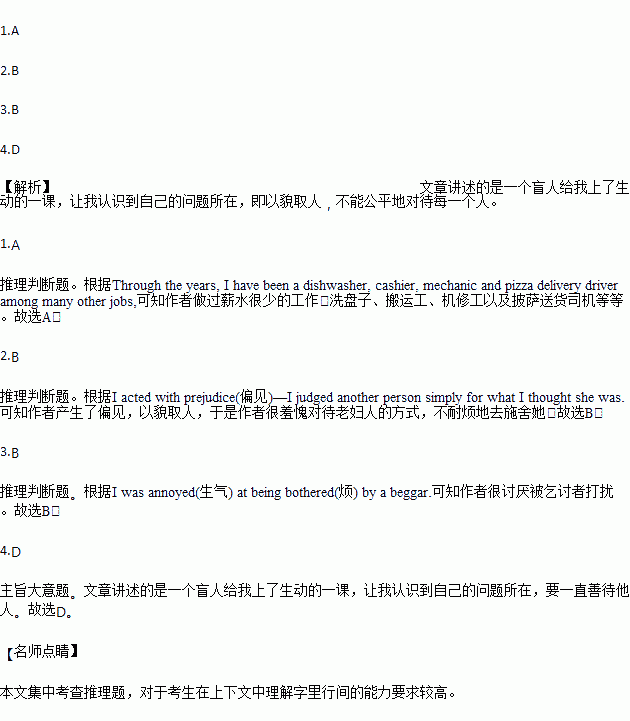题目内容
A few years ago, I took a sightseeing trip to Washington D.C. I saw many of our
nation’s treasures, and I also saw a lot of unfortunate people like beggars and homeless folks(人们)in the streets.
Standing outside the Ronald Reagan Center, I heard a voice say,“Can you help me?”When I turned around, I saw an elderly blind woman with her hand extended(伸出). In a natural reaction, I reached into my pocket, pulled out all of my loose change and placed it in her hand. I didn’t even look at her. I was annoyed(生气) at being bothered(烦) by a beggar.
But the blind woman smiled and said, “I don’t want your money. I just need help finding the post office.”
Immediately, I realized what I had done. I acted with prejudice(偏见)—I judged another person simply for what I thought she was.
The thing I had forgotten about myself is that I am an immigrant. I left Honduras and arrived in America at the age of 15. Through the years, I have been a dishwasher, cashier, mechanic and pizza delivery driver among many other jobs, and finally I became a network engineer.
In my own life, I have experienced many open acts of prejudice. I remember a time, at age 17— I was a busboy, and I heard a father tell his little boy that if he did not do well at school, he would end up like me.
But now, living in my American middle-class lifestyle, it is too easy to forget my past, to forget who I am and where I have been, and to lose sight of where I want to be going. That blind woman on the street of Washington D.C. cured(治愈) me of my blindness. She reminded me to always keep my eyes and heart open.
1.When the author came to America at first ______.
A. he usually did some work with a little payment.
B. he used to beg for some money on the street.
C. he lived a comfortable life as a network engineer.
D. he was respected by others all the time.
2.According to the passage, what did the author regret(后悔)?
A. That he gave all his change to the blind woman.
B. The way he treated the blind woman.
C. That he came to Washington
D. C. for a visit.
3.We can infer all of the following statements from the passage EXCEPT ____.
A. He disliked being bothered by beggars.
B. He was delighted to give away his money to beggars.
C. He once suffered a lot.
D. The blind woman didn’t beg for money at that time.
4.What does the author want to tell us through this story?
A. Don’t dream up ways to get what you want.
B. Money is the root of all evils.
C. An easy life makes a person forgetful. 
D. Be good to others all the time.

